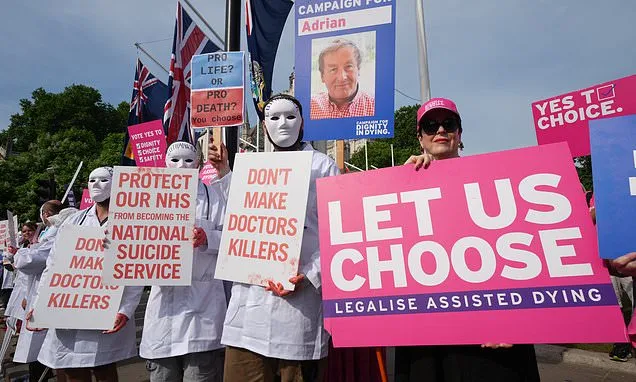Campaigners have gathered outside Parliament to make last-ditch appeals for and against assisted dying as MPs prepare for a crucial vote.
Legalisation could move a step closer for England and Wales depending on the result on Friday.
The outcome will lead to the Terminally Ill Adults (End of Life) Bill either clearing the House of Commons and moving to the Lords, or falling completely - with a warning the latter could mean the issue might not return to Westminster for a decade.
The relatively narrow majority of 55 from the historic yes vote in November means every vote will count on Friday.
The Bill would fall if 28 MPs switched directly from voting yes to no, but only if all other MPs voted the same way as in November, including those who abstained.
Supporters and opponents of a change in the law gathered at Westminster early on Friday, holding placards saying "Let us choose" and "Don't make doctors killers".
On the eve of the vote, in what will be seen as a blow to the Bill, four Labour MPs confirmed they will switch sides to oppose the proposed new law.
Paul Foster, Jonathan Hinder, Markus Campbell-Savours and Kanishka Narayan wrote to fellow MPs to voice concerns about the safety of the proposed legislation.
They branded it "drastically weakened", citing the scrapping of the High Court judge safeguard as a key reason.
Conservative leader Kemi Badenoch urged her MPs to vote against the legislation, describing it as "a bad Bill" despite being "previously supportive of assisted suicide".
As it stands, the proposed legislation would allow terminally ill adults in England and Wales with fewer than six months to live to apply for an assisted death, subject to approval by two doctors and a panel featuring a social worker, senior legal figure and psychiatrist.
Bill sponsor Kim Leadbeater has insisted the replacement of High Court judge approval with multidisciplinary panels is a strengthening of the legislation, incorporating wider expert knowledge to assess assisted dying applications.
Before confirmation of the four vote-switchers, Ms Leadbeater acknowledged she expected "some small movement in the middle" but that she did not "anticipate that that majority would be heavily eroded".
She insisted her Bill is "the most robust piece of legislation in the world" and has argued that dying people must be given choice at the end of their lives in a conversation which has seen support from high-profile figures including Dame Esther Rantzen.
MPs have a free vote on the Bill, meaning they decide according to their conscience rather than along party lines.
There is no obligation on MPs to take part in the vote, and others present on Friday could formally abstain.
All eyes will be on whether Prime Minister Sir Keir Starmer and senior colleagues continue their support for the Bill.
Sir Keir indicated earlier this week that he had not changed his mind since voting yes last year, saying his "position is long-standing and well-known".
Health Secretary Wes Streeting described Ms Leadbeater's work on the proposed legislation as "extremely helpful", but confirmed in April that he still intended to vote against it.
Culture Secretary Lisa Nandy has voiced her continued backing of the Bill, saying she she hopes it can clear the Commons and continue its progress to becoming law.
She told Sky News she has a "long-standing personal commitment to change the law on assisted dying with appropriate safeguards" and praised the "very considered and respectful debate over the last few months on all sides".
A vote must be called before 2.30pm, as per parliamentary procedure.
Ms Leadbeater has warned it could be a decade before legislation returns to Parliament if MPs reject her Bill on Friday.
A YouGov poll of 2,003 adults in Great Britain, surveyed last month and published on Thursday, suggested public support for the Bill remains at 73% - unchanged from November.
The proportion of people who feel assisted dying should be legal in principle has risen slightly, to 75% from 73% in November.
